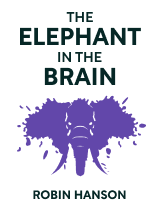

This article is an excerpt from the Shortform book guide to "The Elephant in the Brain" by Robin Hanson and Kevin Simler. Shortform has the world's best summaries and analyses of books you should be reading.
Like this article? Sign up for a free trial here .
What is the main purpose of education in society? Does education have a hidden agenda? Do employers care more about your education or your degree?
According to Kevin Simler and Robin Hanson, some institutions are about shaping society in a desired direction. They argue that education is about producing good citizens and employees, getting them accustomed to rules, schedules, and authority figures.
Keep reading to learn more about this intriguing view of education’s purpose.
The Main Purpose of Education
Humans are inherently resistant to control and hierarchies. In order to get around this resistance, we have institutions that say they benefit the individual but actually serve some other purpose.
So, what is the main purpose of education in society? The authors say that education isn’t just about learning—it’s also about molding students into good future employees and citizens. They argue that standardized schooling is a method for systematically overcoming humans’ natural resistance to authority. In other words, one function of school is to civilize students by getting them accustomed to power hierarchies, schedules, and being evaluated and judged. Part of the goal is to turn students into citizens—that’s why schools instill civic identity by teaching and enforcing the history, customs, and norms of a given society. For example, in the US, students are required to recite the Pledge of Allegiance, an oath of fealty to the US flag and government that’s often taught before students even begin to understand government or politics.
But, above all, the authors suggest that the underlying motivation of schooling is to make people into good modern employees by teaching them to accept authority and routines. The authors give examples of societies that installed industrial economies without an established educational system: The result was workers who refused to follow instructions, only worked when and how much they wanted to, and so on.
(Shortform note: Simler and Hanson mostly focus on schools’ explicit structure—things like schedules, rules, and authority figures. But according to author Alfie Kohn, education’s role in instilling discipline lies even deeper—he argues that the curriculum itself is designed to control and pacify students. According to Kohn, research shows that learning is more effective when it emphasizes student autonomy and creative projects over fact memorization and top-down instruction. Yet, he says, many teachers and administrators favor traditional methods like lectures, worksheets, and so on because those methods are much more likely to produce students who do what they’re told.)
That’s why the authors argue that a main function of schools is to certify their graduates as good potential employees. The authors point out that education doesn’t necessarily seem like good preparation for work: Many degrees aren’t directly applicable to the workplace—and besides, students quickly forget what they’ve learned. They also point out that in many universities, anyone can audit classes and receive the same instruction that paying students receive, with the only difference being the lack of a diploma at the end.
From this, the authors conclude that employers care less about your education itself than they care about your degree—because of what the degree implies about you. A good transcript or a degree from a good school demonstrates a number of character traits (persistence, organization, punctuality, responsibility, willingness to follow rules and instructions, general intelligence) that bode well for the modern workplace. A degree proves that you can succeed in a hierarchical, structured institution that demands you spend a lot of time on tedious tasks.
(Shortform note: In Quiet, Susan Cain argues that schools are so focused on making students into good employees that they’ve reshaped the curriculum according to perceived business needs. Specifically, she argues that schools have come to favor cooperative and group learning because these methods align with corporate preferences for teams and committees. Similarly, the popularity of STEM education in recent years is driven by the desire to prepare students for future careers.)

———End of Preview———
Like what you just read? Read the rest of the world's best book summary and analysis of Robin Hanson and Kevin Simler's "The Elephant in the Brain" at Shortform .
Here's what you'll find in our full The Elephant in the Brain summary :
- How human behavior is driven by selfish motives
- Why your own brain is hiding your intentions from you
- Why the purpose of education is to certify future employees






